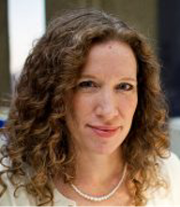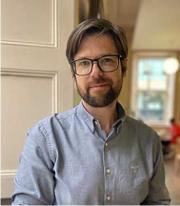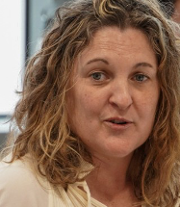Keynote speakers
The lectures from the Keynote speakers will be streamed.
 Kara Morgan-Short (University of Illinois)
Kara Morgan-Short (University of Illinois)
Kara Morgan-Short (Ph.D., Georgetown University) is Professor at the University of Illinois Chicago (UIC), with a joint appointment in the Department of Hispanic and Italian Studies and the Department of Psychology where she directs the Cognition of Second Language Acquisition Lab. Kara is also affiliated with the Laboratory of Integrative Neuroscience at UIC, is currently co-editor of the Language Learning Cognitive Neuroscience Series, and serves on editorial boards. Informed by the fields of linguistics, cognitive psychology and neuroscience, Kara Morgan-Short’s research aims to elucidate the linguistic and (neuro)cognitive processes underlying late-learned second language acquisition and use. Further, her research explores how these processes may be moderated by the effects or interactions of factors external to the learner, such as the context under which a second language is learned, and factors internal to the learner, such as learners’ level of proficiency or learners’ individual cognitive abilities (e.g., working memory, declarative/procedural memory, attention). These issues are examined using a set of complementary behavioral (e.g., accuracy on spoken language tasks) and electrophysiological (event-related potentials, ERPs) approaches. Results of her work have been published in such journals as Language Learning, Studies in Second Language Acquisition, Bilingualism: Language and Cognition, and Journal of Cognitive Neuroscience.
Keynote's Talk: Friday June 27th, 16:55 CEST
Electrifying SLA: Neurocognitive insights into the potential of adult language learning.
Neurocognitive research demonstrates the potential of adults to successfully learn and process second and additional languages (L2/As). However, this research has not yet fully addressed how contextual and individual difference factors, which are widely studied in behavioral L2/A research, contribute to neurocognitive processing of language. With a focus on electrophysiological evidence of brain activity during language processing, this talk will provide a state-of-the-art review of how context (e.g., classroom and study abroad contexts) and cognitive individual differences (e.g., working memory, declarative and procedural memory) affect neurocognitive processing of L2/A grammar. Further, the talk will delve into emerging lines of electrophysiological research that are expected to increase our understanding of the neurocognitive processes that support L2/A as moderated by context and individual differences. By synthesizing this research, the talk aims to provide insights into how these factors contribute to successful L2/A learning and neurocognitive processing, how they could be leveraged to enhance success in L2/A across a wide range of contexts and individuals, and how future collaborative research has the potential to move forward both theoretical and applied perspectives of adult language learning.
 Theres Grüter (University of Hawaii)
Theres Grüter (University of Hawaii)
Theres Grüter is a Professor in the Department of Second Language Studies at the University of Hawai‘i at Mānoa. Her research investigates how language users of all kinds – adults and children, monolingual and bilingual - process and acquire structural aspects of language (aka grammar). Grüter particularly interested in how we integrate information from various linguistic (e.g., phonological, syntactic, semantic) and non-linguistic (e.g., event structure, visual information) sources, how we do so as quickly and successfully as we typically do in everyday communication, and how this ability develops over time in various language learners.
Keynote's Talk: Thursday June 26th, 9:00 CEST
Can guessing enhance learning? Exploring prediction error as a mechanism for language learning.
Different lines of experimental research in cognitive science, psycholinguistics, and educational psychology converge on the observation that (language) learners tend to be more successful when they are engaged in tasks that involve predicting upcoming information (Bovolenta & Marsden, 2022; Brod, 2020; Chang, Janciauskas, & Fitz, 2012). This raises the question as to what extent this mechanism can be used strategically to enhance language learning. At the same time, we know from research on L2 sentence processing that non-native speakers do not always engage in prediction to the same extent as native speakers during real-time language processing (Kaan & Grüter, 2021). As I will argue, L2 users' reduced engagement in prediction can be viewed as a reflection of their optimal use of resources to maximize processing efficiency, rather than a failure to "achieve native-like processing efficiency". Nevertheless, an interesting conundrum arises: If prediction (error) is a mechanism for learning, and L2 users tend to refrain from prediction, are they missing out on valuable opportunities to learn from prediction errors? If so, can tasks that force learners to predict support L2 learning?
In this talk, I will present findings from a series laboratory-based structural priming and visual world eye-tracking experiments with learners of English, German, and Mandarin Chinese, in which we explore how a 'guessing game' task embedded in a structural priming paradigm can enhance learners' uptake of grammatical constructions in their own subsequent productions (it can; Grüter, Zhu, & Jackson, 2021, in progress), influence their acceptability judgments (it does not; Zhu & Grüter, 2024; Jackson & Grüter, in prep.) and affect their engagement in real-time predictive processing (it's a long story; Zhu & Grüter, in press, under review). I will conclude by reflecting on how research on prediction and learning in SLA can benefit from and contribute to our understanding of language development and learning within the wider fields of cognitive science, psycholinguistics, and educational psychology.
 Patrick Rebuschat (Lancaster University)
Patrick Rebuschat (Lancaster University)
Patrick Rebuschat is Professor of Linguistics and Cognitive Science at Lancaster University, where he holds the Camões Institute Chair for Multilingualism and Diversity. His research explores the cognitive foundations of language learning and processing, with a particular focus on implicit learning, statistical learning, second language acquisition, and heritage language bilingualism.
He is Distinguished International Professor at the LEAD Graduate School at the University of Tübingen and Director of the Heritage Language 2 Consortium (HL2C), a strategic partnership involving six leading universities and the Portuguese Ministry of Foreign Affairs. At Lancaster, he co-directs both the Multilingualism and Cognition Research Group and the Lancaster Language Learning Lab (4L).
Keynote's Talk: Thursday June 26th, 16:55 CEST
Language learning under uncertainty: Insights from cross-situational learning for SLA
Statistical learning, i.e. our ability to extract structure from sensory input by tracking regularities over time, is a foundational cognitive mechanism that supports a wide range of functions, including language acquisition, visual perception, memory, and social inference. One specific type, cross-situational learning (CSL), has received growing attention for its relevance to language learning across the lifespan, from infancy to adulthood.
CSL refers to the ability to track and integrate statistical regularities across multiple learning episodes in order to form associations between linguistic forms and their meanings or functions—typically under conditions of referential uncertainty, without feedback, and through incidental exposure. This makes CSL especially relevant for L2 acquisition in immersion or input-rich environments, where learners encounter noisy, variable input and must infer form–meaning mappings without explicit instruction—conditions that closely mirror naturalistic L2 learning outside the laboratory.
In this keynote, I explore how CSL research can deepen our understanding of how novel languages are acquired. I begin by situating CSL within the broader statistical learning framework and present a series of studies from our lab that illustrate how CSL research is conducted and demonstrate its relevance for SLA.
In the second part of the talk, I present (for the first time) findings from a large-scale methodological synthesis and meta-analysis of CSL studies (230 experiments, 18,210 participants), identifying overall effect sizes and key moderating variables. The analysis confirms CSL as a robust and flexible learning mechanism, while also revealing important gaps in the literature.
I conclude by considering how CSL paradigms can inform SLA theory, offering new insights into the learning mechanisms that underpin L2 acquisition, as well as the roles of individual differences and instructional context. One of my key objectives is to foster greater cross-domain integration—bringing together researchers in statistical learning and SLA to build more unified, cognitively grounded models of language learning. I also outline concrete directions for future research aligned with this goal, drawing on recent calls for theoretical integration across domains (Frost et al., 2019; Rebuschat, 2022).
 Bernadette O'Rourke (University of Glasgow)
Bernadette O'Rourke (University of Glasgow)
Bernadette O’Rourke research sits within the broad area of sociolinguistics and the sociology of language and focuses on the political and social meanings of language and their influence on society. She has specialisms in:
- Minority languages
- Multilingualism
- Language policy
- Language ideologies
She is particularly interested in the dynamics of multilingual societies, language revitalization in minoritized languages, ethnography of resistance, language ideologies and language activism. She has examined these dynamics across a range of fieldwork sites and language contexts including Galician (northern Spain), Irish, Scottish Gaelic and Faroese. Since 2011, She have been examining the experiences of “new speakers” of minority languages (so-called “non-native” speakers who acquire a language outside of the home). In more recent years, she has extended this focus beyond minority language contexts, exploring theories around the sociolinguistics of the “speaker” across a range of multilingual strands in the context of migration and transnational mobilities.
Keynote's Talk: Saturday June 28th, 12:00 CEST
(New) Speakers and New (Speakerness): Concepts, Theories and Contemporary Debates.
While it is often accepted that globalization can be a factor in the dissolution and extinction of minority languages, this complex process does not result solely in language loss. Languages and linguistic varieties are often taken up and used by new speakers, for new purposes and in new spaces, initiating what I refer to here as a process of language gain. In this talk I will trace the early development of the new speaker phenomenon, particularly in the context of European minoritized languages, where we have seen a growing interest amongst researchers, practitioners, and policy makers over the past decade. As I will show, the term has not however been restricted to Europe’s historically minoritized languages but has also included multilingual citizens more broadly in the context of migration and transnational working, who “engage in languages other than their ‘native’ or ‘national’ language(s) […] and find themselves crossing existing social boundaries, re-evaluating their own levels of linguistic competence and having to creatively (re)structure their social practices to adapt to new and overlapping linguistic spaces” (O’Rourke et al. 2019: 10). Drawing on this broader definition, I will examine the potential of the term not simply to define a category of speaker but as a theoretical lens through which new speakerness can be used to interrogate three inter-related assumptions which have for long shaped the field of linguistics and related strands. These include (1) languages as bounded, discrete, and named entities; (2) territorialized notions of language within bounded communities of place; (3) the native speaker ideology. While making a case for the merits of the new speaker concept and new speakerness, I would also like to explore a number of challenges and dilemmas presented by these notions which I believe also require critical engagement. As I will show, these dilemmas can be very visible for scholars in the fields of minority language sociolinguistics and language revitalization studies, who often work closely with language advocates and policy makers to bring about positive change. I will reflect on how some of the critical thinking in which we as researchers engage around language, territory and nativeness, can sometimes be at odds with the social realities of speakers and communities on the ground, who may resist newer understandings of what a language is and what it means to be a speaker.